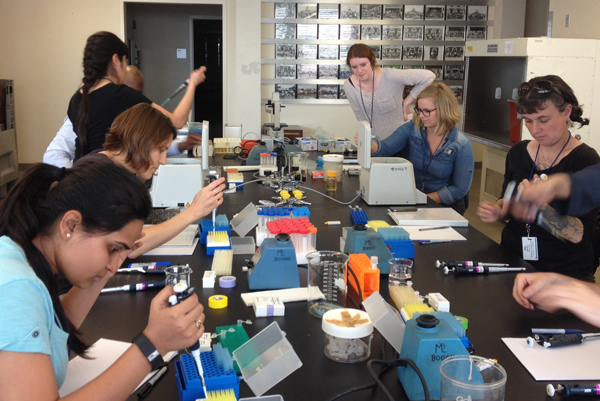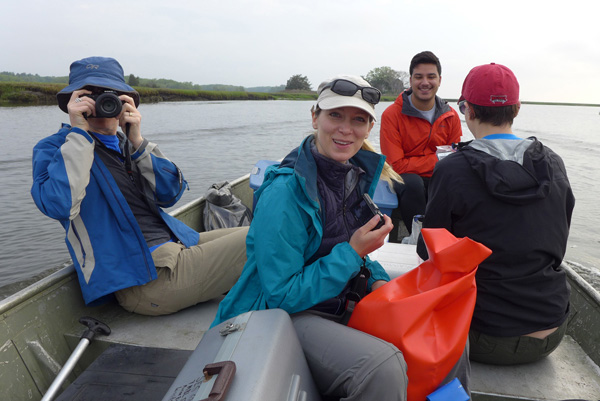MBL Announces Recipients of Science and Health Journalism Fellowships

Contact: dkenney@mbl.edu; 508-289-7139
WOODS HOLE, Mass. – Twelve journalists have been awarded Logan Science Journalism Fellowships from the Marine Biological Laboratory (MBL), an international center for biological and environmental research and education and an affiliate of the University of Chicago.
Now in its 32nd year, the Logan Science Journalism Program (SJP) allows established science and health journalists to “step into the shoes of the scientists they cover” through immersion in hands-on research training at the MBL. The program, which offers fellows the choice of a biomedical or an environmental research course, will run from May 30 to June 7 in Woods Hole.
Four of the selected journalists were also awarded Chicago Fellowships to attend the Science of Innovation Summit for Journalists in October 2018. This four-day summit at the University of Chicago is co-hosted by the university’s Office of Research, Innovation and National Laboratories and its Polsky Center for Entrepreneurship and Innovation.
 Biomedical Course Fellows in the lab. Credit: Brad Shuster
Biomedical Course Fellows in the lab. Credit: Brad ShusterThe 2018 Logan Science Journalism Program Fellows are:
Biomedical Fellows
Cassie Chew*, Freelance Journalist (Washington, D.C.)
Tara Haelle, Independent Journalist (Peoria, IL)
Shayla Love*, Staff Writer, Vice (Brooklyn, NY)
Macon Morehouse, News Director, Science News (Washington, D.C.)
Irene Rodríguez-Salas, Science Journalist, La Nación newspaper (San José, Costa Rica)
Duanduan Yuan*, Senior Journalist, Health & Environment, Southern Weekly (Beijing, China)
Environmental Fellows
Katherine Bourzac, Freelance Journalist (San Francisco, CA)
Jes Burns*, Multimedia Journalist, EarthFix, Oregon Public Broadcasting (Ashland, OR)
Drew Costley, Freelance Multimedia Journalist (San Francisco, CA)
Lorelei Goff, Freelance Journalist (Greeneville, TN)
Suzanna Masih, Senior Sub-Editor, The News International (Karachi, Pakistan)
Mićo Tatalović, Environment News Editor, New Scientist (London, UK)
*Chicago Fellowship Recipient
 Heading out for field work in the Environmental Course.
Heading out for field work in the Environmental Course.Credit: David S. Johnson
In the Biomedical Hands-On Research Course, fellows plunge into the fundamental approaches that underpin current biomedical science. Using both new and established model systems, fellows learn essential techniques and concepts in cell, molecular, and developmental biology and genomics.
The Environmental Hands-On Research Course fellows undertake field research at a barrier beach, saltmarsh and watershed ecosystem on Cape Cod. They discover the complex ways that added nitrogen alters coastal ecosystems, including their capacity to keep up with sea-level rise and impacts on marine life and coastal food webs.
The fellows present their data at a mini-symposium at the close of the fellowship. They also have opportunities to explore the rich scientific resources in Woods Hole.
The Biomedical Hands-On Research Course is co-directed by Charles “Brad” Shuster, Ph.D., of New Mexico State University and Phong Tran, Ph.D., of the University of Pennsylvania Perelman School of Medicine. The course’s journalism advisor is Maryn McKenna, science journalist, author, and senior fellow, Schuster Institute for Investigative Journalism at Brandeis University.
The Environmental Hands-On Research Course is directed by Anne Giblin, Ph.D., MBL Senior Scientist and Interim Director of the Ecosystems Center. Science journalist/producer Angela Posada-Swafford, a U.S. correspondent for Madrid’s Muy Interesante Magazine, is the course’s journalism advisor.
Over the years, the Logan Science Journalism Program has granted fellowships to hundreds of journalists from prominent news organizations, including The New York Times, The Wall Street Journal, Science, National Public Radio, The Washington Post, USA Today, CNN, and Scientific American.
Caption for home page photo: Sarah Kaplan of The Washington Post and María Mónica Monsalve of El Espectador conduct field research as Logan Science Journalism Fellows in 2017. Credit: Craig LeMoult, WGBH Boston
—###—
The Marine Biological Laboratory (MBL) is dedicated to scientific discovery – exploring fundamental biology, understanding marine biodiversity and the environment, and informing the human condition through research and education. Founded in Woods Hole, Massachusetts in 1888, the MBL is a private, nonprofit institution and an affiliate of the University of Chicago.
The Logan Science Journalism Program is sponsored by: George & Helen H.B. Logan; Friends and Alumni of the Science Journalism Program; Golden Family Foundation; Howard Hughes Medical Institute; Irving Weinstein Foundation, Inc.; Ross Foundation; and the Byron H. Waksman Fund for Excellence in Science Communication.